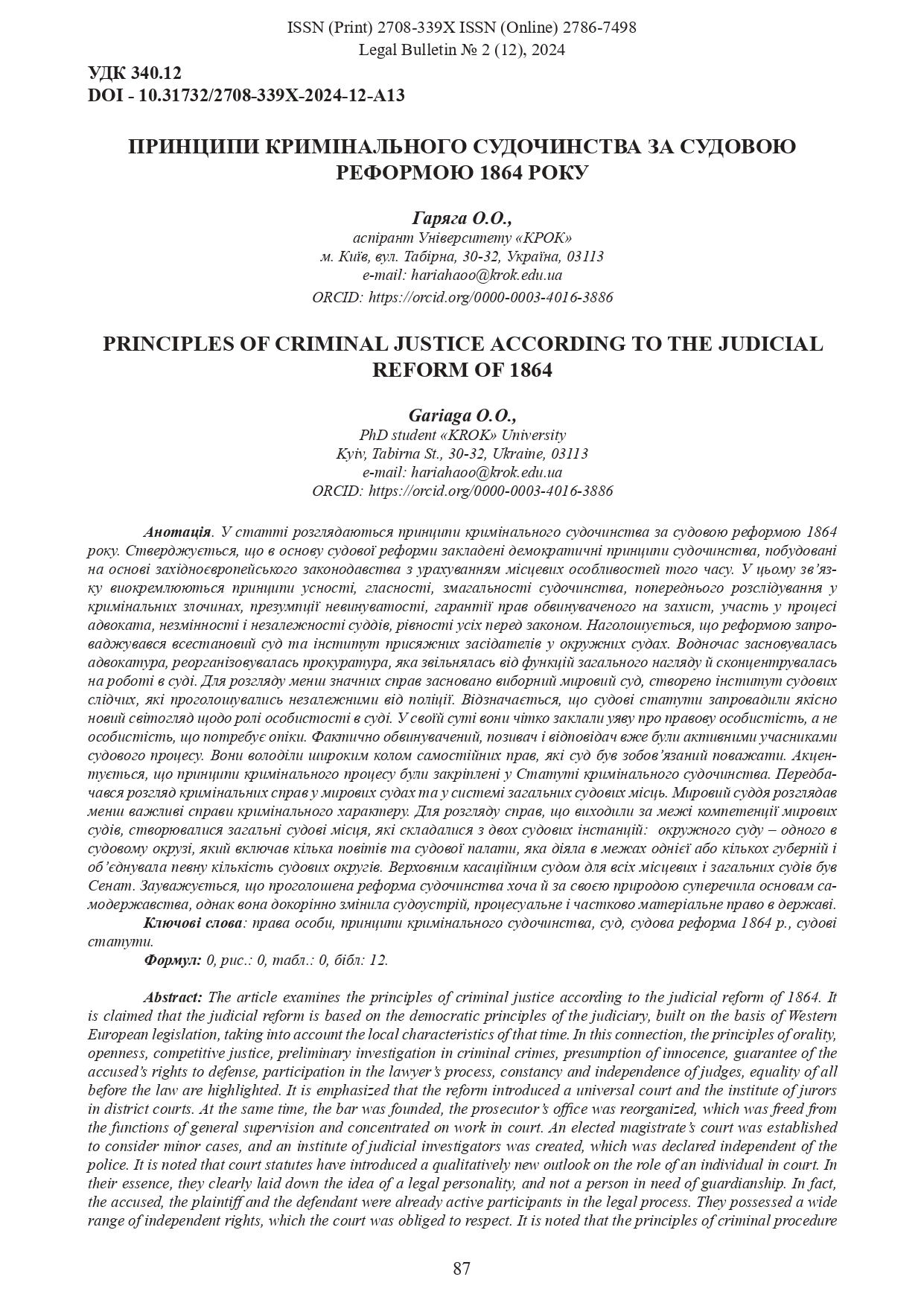PRINCIPLES OF CRIMINAL JUSTICE ACCORDING TO THE JUDICIAL REFORM OF 1864
DOI:
https://doi.org/10.31732/2708-339X-2024-12-A13Keywords:
individual rights, principles of criminal justice, court, judicial reform of 1864, court statutesAbstract
The article examines the principles of criminal justice according to the judicial reform of 1864. It is claimed that the judicial reform is based on the democratic principles of the judiciary, built on the basis of Western European legislation, taking into account the local characteristics of that time. In this connection, the principles of orality, openness, competitive justice, preliminary investigation in criminal crimes, presumption of innocence, guarantee of the accused's rights to defense, participation in the lawyer's process, constancy and independence of judges, equality of all before the law are highlighted. It is emphasized that the reform introduced a universal court and the institute of jurors in district courts. At the same time, the bar was founded, the prosecutor's office was reorganized, which was freed from the functions of general supervision and concentrated on work in court. An elected magistrate's court was established to consider minor cases, and an institute of judicial investigators was created, which was declared independent of the police. It is noted that court statutes have introduced a qualitatively new outlook on the role of an individual in court. In their essence, they clearly laid down the idea of a legal personality, and not a person in need of guardianship. In fact, the accused, the plaintiff and the defendant were already active participants in the legal process. They possessed a wide range of independent rights, which the court was obliged to respect. It is noted that the principles of criminal procedure were enshrined in the Statute of Criminal Procedure. Consideration of criminal cases was envisaged in magistrates' courts and in the system of general courts. The magistrate considered minor criminal cases. To consider cases that were beyond the jurisdiction of magistrates' courts, general courts were created, which consisted of two judicial instances: a district court - one in a judicial district that included several counties, and a judicial chamber that operated within one or more provinces and regions connected a certain number of judicial districts. The Supreme Court of Cassation for all local and general courts was the Senate. It is noted that the announced reform of the judiciary, although by its very nature, contradicted the foundations of autocracy, however, it fundamentally changed the judicial system, procedural and partially material law in the state.
References
Бурдін М. Ю. Запобіжні заходи за Статутом кримінального судочинства 1864 р. Вчені записки Таврійського національного університету ім. В.І. Вернадського. Серія «Юридичні науки». 2011. Т. 24(63). №2. С. 11-16.
Вайновський А. М. Еволюція самоорганізації судової влади на українських землях. Вісник маріупольського державного університету. Серія: Право. 2013. Вип. 5. С. 179-185.
Зеленський С. М. Презумпція невинуватості як гарантія справедливості кримінального провадження. Право і суспільство. 2017. № 5. С. 244-249.
Іскендеров Е. Ф. Становлення та розвиток діяльності органів досудового розслідування за Статутом кримінального судочинства 1864 р. та їх місце у кримінальному процесуальному доказуванні. Вісник кримінального судочинства. 2015. № 4. С. 39-45.
Котуха О. С. Презумпція невинуватості – історико-правовий аспект. Судова апеляція. 2009. № 1(14). С. 51-58.
Кравчук В. М. Історико-правові аспекти основ правового статусу суддів на українських землях у складі Російської імперії (кінець XVIII – початок ХХ століття). Актуальні проблеми вітчизняної юриспруденції. 2016. № 4. С. 3-7.
Крушинський С. А. Поняття доказів у кримінальних справах за Статутом кримінального судочинства 1864 року. Університетські наукові записки. 2011. № 3(39). С. 324-329.
Легка І. В. Особливості нормативного становлення на теренах України ідеї гласності судового процесу як конституційної засади. Аналітичне-порівняльне правознавство. 2022. № 5. С. 76-81.
Липитчук О. В., Лешкович Н. О. Суд і судочинство в Росії після судової реформи 1864 року. Науковий вісник Львівського державного університету внутрішніх справ. Серія юридична. 2014. № 1. С. 44-54.
Липитчук О., Лешкович Н. Судова реформа 1864 року і проблеми формування правової свідомості в Росії (друга половина ХІХ − початок ХХ ст.). Науковий вісник Львівського державного університету внутрішніх справ. Серія юридична. 2014. № 60. С. 81-90.
Судова влада в Україні: історичні витоки, закономірності, особливості розвитку / За редакцією І. Б. Усенка. Київ «Наукова думка». 2014. 502 с.
Чудновський О. В. Судова реформа 1864 р. та прокуратура на українських землях у складі Російської імперії

Downloads
Published
How to Cite
Issue
Section
License
Copyright (c) 2024 Гаряга О.О.

This work is licensed under a Creative Commons Attribution 4.0 International License.




